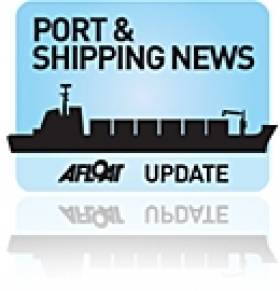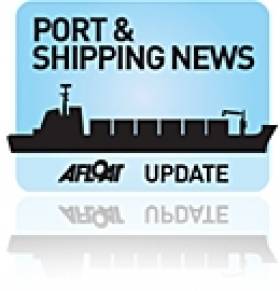Displaying items by tag: Harbours Bill 2015
Shipping Review: Worlds Largest PCTC Visits Dublin, President Signs Harbours Bill & More
#ShippingReview – Jehan Ashmore reviews the shipping scene over the last fortnight where among the stories are outlined below.
The World's largest pure car and truck carrier (PCTC) vessel, Höegh Target, with a capacity for 8,500 car equivalent units departed Dublin Port in late December.
President Michael D Higgins signed the Harbours Bill into law on Christmas Day, the first time a President has signed legislation in to law on that day.
The Environmental Protection Agency (EPA) has requested more details as it assesses Dublin Port's plans to dump 10 million tonnes of "seabed material" in the Irish Sea off Howth.
Dundalk Port could soon be controlled by Louth County Council following the signing of the Harbours Bill by President Higgins.
#ShippingReview – Over the last fortnight, Jehan Ashmore has reported on the shipping scene.
Smart Tina of 38,900 tonnes became the largest ever ship to call to Greenore. The Co. Louth port having recently underwent an extensive dredging project.
The eight-legged 'walking' jack-up rig Wavewalker 1 carries out maintenance work at Arklow Bank Offshore Windfarm.
Ireland's first Maritime Industry Awards took place in Dublin. The Overall Maritime Excellence Award went to Resolute Marine Energy.
Government approves the Harbour Bill 2015 which allows transfer of Certain Ports to Local Authorities. The ports covered of Regional Significance are Drogheda, Dún Laoghaire, Galway, New Ross and Wicklow.
Dublin Port Company to pay dividend of €8.8 million to the State for the 2014 financial year. The dividend represents 30% of the port's distributable profits for 2014.
For 10 days the Waterford Estuary has seen the dredger Causeway work to maintain required depths of the shipping lane downriver of Belwiew Port.
Minister for Transport, Tourism and Sport, Paschal Donohoe TD, has secured Government approval for the Harbours Bill 2015. The purpose of the Bill is to provide the necessary legal basis to allow for the later transfer by Ministerial Order of the control of the five Ports of Regional Significance – Drogheda, Dún Laoghaire, Galway, New Ross and Wicklow – to local authority led governance structures. In addition, the Bill will further enhance the corporate governance structures of all port companies including the five proposed transferee ports and those relevant Ports of National Significance – Cork, Dublin, Shannon Foynes and Waterford.
Minister Donohoe said: 'This Bill is another important step in the development of our commercial ports sector. The Bill provides the legal basis to one of the key recommendations of National Ports Policy, published in 2013, namely that control of those designated Ports of Regional Significance should transfer to more appropriate local authority led governance structures. The transfers also support Government's reforms in the area of local government generally through enhancing the role of the local authority in regional economic development'.
The Bill will provide for the later transfer of Drogheda, Dún Laoghaire, Galway, New Ross and Wicklow to local authority led governance structures. The Bill allows for two different transfer methods –
1) A transfer of shareholding in the existing company structure and retention of the existing company [Part 2 of the Bill], or
2) A dissolution of the existing company structure and complete integration within local authority structures [Part 3 of the Bill].
These transfers will take place on foot of a later Ministerial Order and the model of transfer chosen will be informed by local authority led due diligence processes currently underway in respect of each company and which has been funded by the Department.
Minister Donohoe said: 'Another important element to the Bill is the reforms introduced to corporate governance generally within all the port companies, irrespective of whether their shareholder is the Minister or the local authority . The Bill introduces new statutory skillsets for directors, requires any prospective chairperson to appear before elected representatives to discuss their appointment, introduces a statutory requirement in relation to accountability generally of chairpersons and CEOs to elected representatives and states that no director can serve beyond 10 years in total'.































































